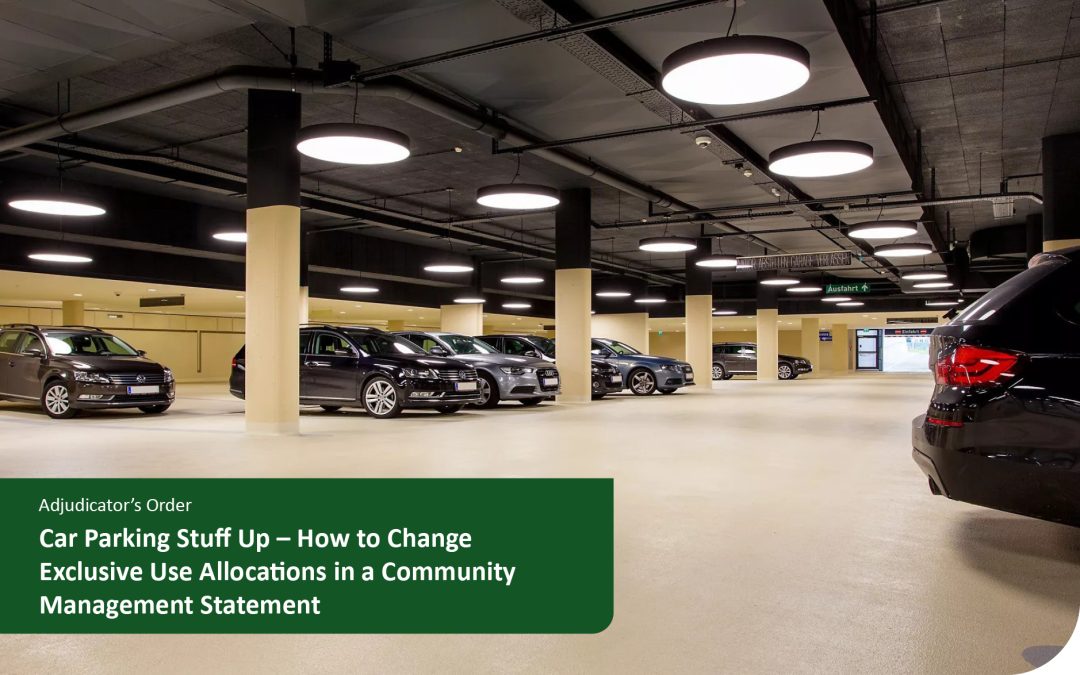In this month’s case update, we learn about Summit Square, and the hapless attempts by an owner to have a car parking exclusive use area changed to remove obstruction to the roller door being opened form that owner’s lot.
In the subject case the applicant owner of lot 1 included a motion in the 2024 AGM asking fellow owners to vote by resolution without dissent on shuffling the car park directly in front of the roller door to lot 1 by 14 centimeters. Under the proposal no other owner was being asked to surrender a car park or accept a car park of a smaller size – it was simply a move all car parks further south by 14 centimeters. A simple request it seems.
At the AGM the applicant’s motion received 3 “no” votes which was enough to tank the proposal.
Accordingly, the applicant set about ventilating his unhappiness at the Commissioner’s Office, seeking an order that the opposition to the motion by other owners was unreasonable in the circumstances and that the motion be deemed passed.
Owners who voted ”no” advised their dissenting votes were based on not wanting to change, having never received a request to move their vehicles and wanting to avoid the obstruction being moved to in front of Lot 3.
Readers of this column will recall Adjudicators are quite hesitant to submit their personal view for that of a voting lot owner and this case was no different.
The Adjudicator held:
- A body corporate is required to act reasonably in the conduct of its functions, including whether to make or not make a decision.
- The issue to consider is whether the votes of dissenting owners were unreasonable, not whether the body corporate fulfilled its duty to reach a reasonable decisions taking into account competing considerations;
- It was necessary to consider whether the reasons for voting “no” were a rational basis for voting “no”;
- The adjudicator’s role is not to strike a reasonable balance between competing positions; and
- Lot owners are entitled to vote in their own interests; and
- Nothing in the Body Corporate and Community Management Act 1997 suggests that an owner may be required by an Adjudicator to enhance that lot owner’s interest
- The dissenting voters do not have to satisfy the Adjudicator that their “no” vote was reasonable – rather the applicant must show that the opposition to the motion was unreasonable.
The Adjudicator reminded the Applicant it was open to him to issue a BCCM Form 11 as to future contravention for obstruction to his roller door.
So… could the Applicant have handled this matter better?
When tackling this type of issue, an aggrieved owner should firstly understand they do not have a right to insist on a change to exclusive use spaces which they seek.
They have no legal ability to compel their neighbours to vote in favour of a change to the exclusive use and they are essentially asking their neighbour to do them a favour.
No matter how trivial that favour might seem to the aggrieved owner – the answer to their prayers is in the hands of their neighbours.
Asking for a favour is a delicate process and we suggest an aggrieved owner starts by talking to their neighbour face to face about the issue to gauge whether or not the neighbour is willing to help and whether they consider the request to be reasonable.
We would also suggest that the costs of lodging a new CMS to reflect a change in exclusive use areas be borne by the aggrieved owner – to demonstrate to other owners that they are not being financially penalised for doing a favour for the aggrieved party.
Those costs would usually include the preparation of the New Community Management Statement, survey plan and lodgment fees.
Above all, put yourselves in the shoes of your neighbour and think about why you would agree to the favour being asked if it was you.
